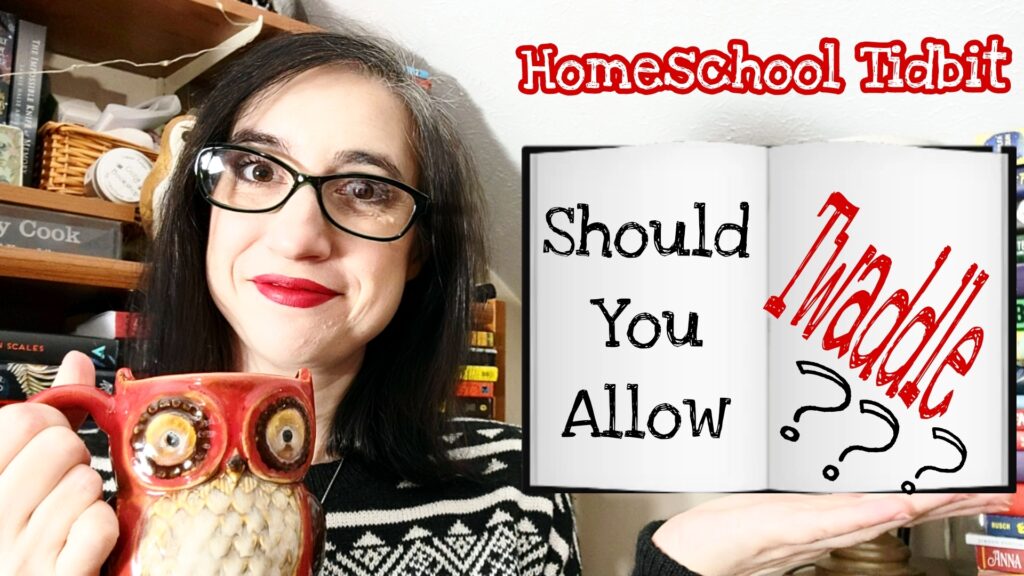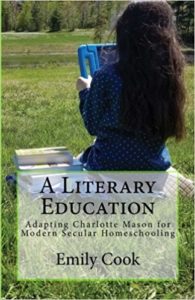Homeschool Tidbits: The Case for Twaddle
January 6, 2023
 Welcome to Build Your Library’s Homeschool Tidbits: Episode 39 – The Case for Twaddle. In this weekly video series, I will delve briefly into a topic related to homeschooling and will share some of my knowledge and expertise as a long-time homeschooling mother of 4 children. Three of whom have graduated high school and one who is a college graduate!
Welcome to Build Your Library’s Homeschool Tidbits: Episode 39 – The Case for Twaddle. In this weekly video series, I will delve briefly into a topic related to homeschooling and will share some of my knowledge and expertise as a long-time homeschooling mother of 4 children. Three of whom have graduated high school and one who is a college graduate!
Charlotte Mason is practically synonymous with living books – and by now, we know what a living book is. We’ve discussed it at length, but you can check out my previous videos if you want to refresh your memory before continuing this video.
What is Twaddle, Anyway?
If a living book is great literature or well-written non-fiction, then the opposite of that must be twaddle. But what exactly is twaddle? Twaddle would describe books that are commercial fiction, or speak down to a child. They are overly simplified and sometimes poorly written. A good example would be books based on favorite cartoon characters, stories full of potty humor, or non-fiction full of stilted writing that assumes children cannot understand higher vocabulary and concepts.
You may now be thinking to yourself, those sound like things to avoid, so why make a case for twaddle?
I’m about to get controversial here. There can be a lot of judging amongst Charlotte Mason purists. For many of them, anything not used by Charlotte Mason herself over 100 years ago, can fall under the category of twaddle. The original meaning of twaddle can often get forgotten, and anything that a person deems to be unworthy of living book status gets labeled as twaddle, based solely on their personal tastes. I’ve even seen the idea that if a book teaches non-Christian values, it should be deemed twaddle.
But here’s the thing. By its nature, literature is subjective. Sure, there are some clearly defined parameters for what makes a book living and what makes a book twaddle. But, within those parameters lies our own preferences. One person’s favorite book is another person’s twaddle.
There will always be books that you decide are not worth your child’s time or attention. Your reasons will vary depending on your child’s personality, your tastes and theirs, and your worldview. But does that automatically make those books twaddle? I don’t think so.
Twaddle is often described as being like junk food. Too many sweets will give you a stomachache, and so by that comparison, too much twaddle will be bad for your child’s mind. I don’t necessarily disagree with this sentiment. But I also don’t agree that you should aim to eliminate all twaddle. What we need instead is a healthy balance. All things in moderation. A cookie after supper isn’t going to ruin your health, therefore a twaddley read once in a while won’t destroy your child’s entire education.
And some twaddle can even be good for a budding reader!
My kids definitely consumed a fair amount of twaddle as they became confident readers. I didn’t police their choices at the library, and a fair amount of reading material that some might label as twaddle came home with us. But to balance that, I chose a good amount of quality literature for us to read together. I also spent years building a home library brimming with living books. Over time, my children learned the differences between good and poor writing, and they gravitated towards the former. And so will yours.
Most of us crave a mindless read once in a while, so why would we try to deprive our children of that? Particularly if we are requiring them to read challenging books, we need to allow them to decompress with an easy read here and there.
When it comes to reading, we want to help our children to grow into confident and discerning readers. To do that, we must allow them some freedom to make their own choices in reading material. Letting them have a free read of their choice once in a while will give them the opportunity to develop their own tastes and the chance to learn the differences between good and poor writing. I promise that with time and your gentle guidance, they will learn to prefer living books to twaddle.
Coming up next…
I hope you found this Tidbit helpful! Come back next week for more homeschooling inspiration!
Until then, happy reading!
See Other Related Articles:
- Happy, Hygge Homeschooling?
- “Are worms made out of metal?” And other great rabbit trails.
- Charlotte Mason in the Secular Homeschool
- A Literary Education book
- About Build Your Library
- Homeschool Tidbits: Build Your Library’s Weekly Video Blog Series
.
 Emily Cook is the author and creator of the secular homeschool curriculum Build Your Library, a literature-based K-12 program infused with the teachings of Charlotte Mason. She writes full-year lesson plans as well as shorter topical unit studies. Emily has been homeschooling her four children in Southern NH for 21 years. She is passionate about reading aloud to children of all ages and loves to share her love of literature with others. She and her family also make incredibly dorky videos about homeschooling, books, and more on Youtube at ARRRGH! Schooling. You can follow her on Facebook, Twitter, and Pinterest. You can also check out her author page on Amazon.
Emily Cook is the author and creator of the secular homeschool curriculum Build Your Library, a literature-based K-12 program infused with the teachings of Charlotte Mason. She writes full-year lesson plans as well as shorter topical unit studies. Emily has been homeschooling her four children in Southern NH for 21 years. She is passionate about reading aloud to children of all ages and loves to share her love of literature with others. She and her family also make incredibly dorky videos about homeschooling, books, and more on Youtube at ARRRGH! Schooling. You can follow her on Facebook, Twitter, and Pinterest. You can also check out her author page on Amazon.
